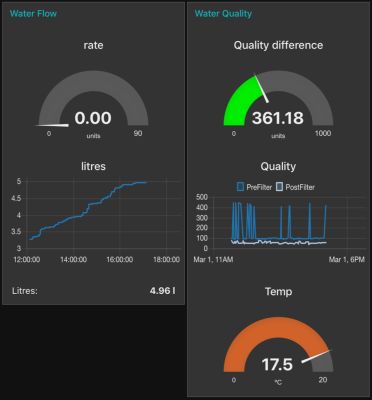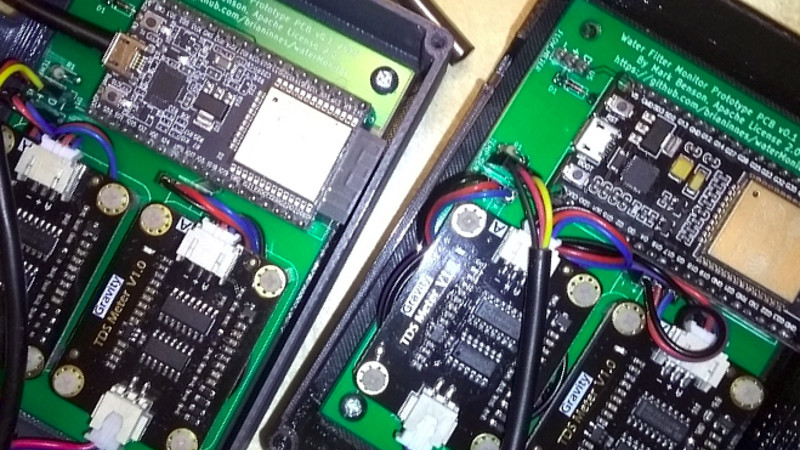Coffee machines are delicate instruments, likely to be damaged by limescale. Thus they will often have a filter present, but filters have a limited capacity of water upon which they can be effective. At Make Bournemouth, they have approached the problem of when to change filters on their coffee machine by applying a bit of high-tech.
 The water passing through the filter is monitored by a couple of DFRobot TDS modules, a flow meter, and a DS18B20 temperature sensor. The data from these is fed into an ESP32 dev board, which makes it available by a web interface for handy accessibility through a smartphone. It can then be used to work out how much of the filter’s capacity has been used, and indicate when a replacement is needed. All the code is available in a GitHub repository, and with luck now Bournemouth’s hackerspace will never see the coffee machine succumb to limescale.
The water passing through the filter is monitored by a couple of DFRobot TDS modules, a flow meter, and a DS18B20 temperature sensor. The data from these is fed into an ESP32 dev board, which makes it available by a web interface for handy accessibility through a smartphone. It can then be used to work out how much of the filter’s capacity has been used, and indicate when a replacement is needed. All the code is available in a GitHub repository, and with luck now Bournemouth’s hackerspace will never see the coffee machine succumb to limescale.
Of course, this isn’t the first coffee maker water hack we’ve brought you. A year or two ago we told you about somebody making their pod coffee maker auto-fill too.
















cant you clr your coffee machine?
Only if the coffee machine uses an AVR processor.
B^)
https://www.microchip.com/webdoc/avrassembler/avrassembler.wb_CLR.html
Can they make one that tells my wife she doesn’t need to de-scale the coffee maker? There is no calcium in our water just a trace of iron.
“From even the greatest of horrors irony is seldom absent.” – H.P. Lovecraft
“My wife has an iron deficiency, so if my clothes appear wrinkled…”
(rimshot!)
I prefer all my water demineralized before it ever enters a coffee maker, dishwasher, or drinking glass for that matter. Eliminates a lot of maintenance, you know.
Can’t imagine why that would be so difficult, but supposing it is, why not just ionize the fluid system to deposit on the already disposable coffee filter? But then again, would it still make coffee?
But I guess coffee maker water filter sales would plummet, and who wants to stop buying those, eh?
You’re harming yourself… but at least you won’t have to clean the coffee pot.
No you’re not. Even if all you drink is RO ultrapure water. You get negligible minerals from the water you drink.
It’s not about getting minerals, it’s about distilled water actually removing them.
It won’t be distilled once it goes through the coffee beans. I suppose if you wanted to just drink the water and are a bit worried, you can mix in a small pinch of salt.
Your body is a complex machine with dozens of systems whose job is to maintain it’s electrolytes. You consume thousands of times more than you need through normal food, nevermind multivitamins many take. RO/distilled water can’t compete unless you’re drinking already dangerous amounts of water. In which case it doesn’t matter how the water is treated. It simply dosen’t ‘remove them’, your body won’t let it.
Yeah, the mysteriously excess oxylates (not a big veggie fan) that have bound themselves to the abundant calcium that finds it’s way to my kidneys, begs to differ. Have at least two excruciating bouts of stones first, then see if your still willing to argue the point. Seems I’m getting plenty of all sorts of minerals from my diet without having it in easily absorbed solution from my beverages.
Espresso Coffee actually doesn’t taste as good when using distilled water. You usually only need to soften the water with a water filter, so that you don’t get scale buildup inside the machine.
Filtered (as opposed to distilled, so it’s “safe” for the tinfoil hat crowd) water from Costco is so cheap as to be almost free. I use it in my aquarium, because it’s even cheaper, and better, than the chemicals used to make tap water safe for fish. I also use it in my hot water pot and Keurig machine, neither of which shows the slightest trace of mineral buildup after years of use and zero-zip-nada cleaning.
But hey, if you can’t think of a more interesting & useful hack to spend time on, then go for it.
Considering the water quality here in Canada, I feel stupid whenever I buy bottled water out of convenience. Can’t imagine buying water to fill my Keurig.
Canada is, of course, a very large country, and the water quality surely varies widely. In any case, where I live (Arlington, Virginia) the water is (presumably) safe to drink, but it contains such a large quantity of dissolved minerals that it creates a very sturdy brown film on appliances such as coffeemakers. It’s vastly easier to use filtered water than to try to clean off all of that gunk.